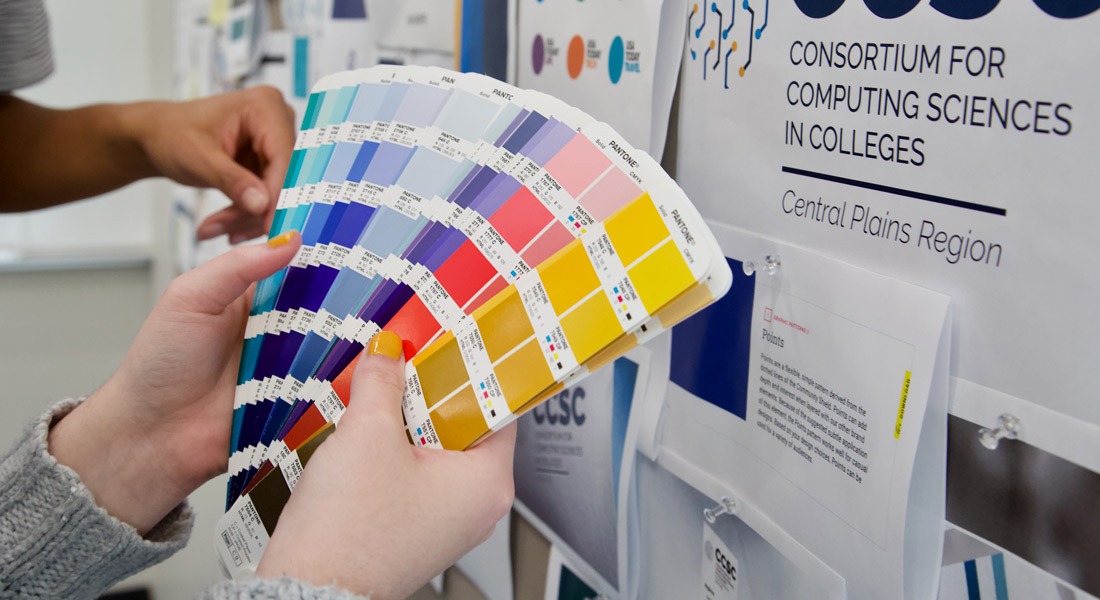CORE COURSES
Take the following courses:
IM-100 Integrated Media Art Seminar
1 CreditsH
AR-102 Principles of Digital Media
3 CreditsCTDH
AR-104 Design and Color
3 CreditsF,CTDH
CM-133 Mass Media and Society
3 CreditsH, CS
EN-376 Writing Across Media
3 CreditsH,CW,CTDHPre-Req: FYC-101 or EN-110 or EN-109.
Take one of the following courses:
IM-375 Community Design Lab
3 CreditsCTDHPrerequisite IM110, sophomore standing or higher.
IM-376 Business of Design
3 Credits
Take one of the following courses:
CS-110 Computer Science I
3 CreditsN,CTGES,CTGISRecommended programming experience or IT110 or IT100, IT111 or IM110 or MA103 but not necessary.
IT-105 Principles of Programming
3 CreditsN,WK-FRPre-Req or Co-Req: FYC-101 or EN-110 or EN-109
Take one of the following courses:
AH-108 Cross Cultural Art 1
4 CreditsF,I,SW-GE Pre-Req or Co-Req: FYC-101 or EN-110 or EN-109
AH-113 Cross-Cultural Art 2
4 CreditsF,I,SW-GE Pre-Req or Co-Req: FYC-101 or EN-110 or EN-109 (NOTE: AR-108 Cross-Cultural Art 1 is NOT a prerequisite for this course.)
EN-273 Visual Literacy
4 CreditsHPrerequisite: EN110 or EN109.
Take one of the following courses:
CM-290 The Metaverse
3 CreditsH, CW, CSPrerequisites: CM133 or IT110 or IT111.
IT-290 The Metaverse
3 Credits H,CW,CS Prerequisites: CM132 or IT110 or IT111.
IMA ELECTIVE COURSE SUGGESTIONS
Take 18 credits from the following courses: (3 credits must be at the 300 level or higher)
DS-242 Info Visualization
3 CreditsN,CTDH,CTGESPrerequisite: AR-102 or CS-110 or DS-110 or IM-110 or IT-110
IM-250 Digital Audio Production
3 CreditsF,CTDH
IM-295 Design Thinking
3 CreditsF,WK-CEPre- or Co-Req: FYC-101 or EN-110 or EN-109.
IM-310 Social Media
3 CreditsFPrerequisites: IM110 or IT110 or IT111 or CS110.
IM-360 Digital Video Production
3 CreditsF,CTDHPrerequisites: IM110 or permission by permission of instructor with prior video experience.
IM-361 Video Production II
3 CreditsF,CTDHPrerequisite: IM360 or by instructor permission.
IM-375 Community Design Lab
3 CreditsCTDHPrerequisite IM110, sophomore standing or higher.
IM-376 Business of Design
3 Credits
AR-203 Digital Photography I
4 CreditsF, WK-CE
AR-204 Digital Art I
4 CreditsF,CTDH,WK-CE
AR-211 The Art of Bookmaking
3 CreditsF,WK-CE Pre-Req or Co-Req: FYC-101 or EN-110 or EN-109
AR-398 3D Computer Animation
4 CreditsFPrerequisite: AR-104 or AR-204 or IM-110 or AR-298.
CM-200 Art of Public Speaking
3 CreditsCS, HPrerequisites: Sophomore, Junior, or Senior standing.
CM-220 Group Communication
4 CreditsH, CS, SW-LEPrerequisite: CM-130 or CM-132 or CM-133. Pre- or Co-Requisite: FYC-101 or EN-110 or EN-109.
EN-273 Visual Literacy
4 CreditsHPrerequisite: EN110 or EN109.
EN-374 Ethical Game Design
3 CreditsSW-ER,H,CWPrerequisite: FYC-101
EN-378 Video Production Writing
4 CreditsH,CW,CTDH,WK-CETake FYC-101 or EN-110 or EN-109
IT-307 Project Management
4 CreditsS,CW,CS,SW-LEPrerequisite: IT-210. Pre-or co-requisite: FYC-101.
IT-341 Web Design
2 Credits Prerequisites: CS110 or permission.
CAPSTONE/EXPERIENTIAL LEARNING
Complete one of the following categories below (3 credit minimum):
CAPSTONE:
Take the following courses (3 credit minimum):
IM-496 IMA Seminar
3 Credits
IM-497 IMA Capstone
3 Credits
PRACTICUM:
Take the following course (3 credit minimum):
IM-398 Integrated Media Practicum
2-4 Credits Prerequisite: IM-375 or IM-376
INTERNSHIP:
Take the following courses (3 credit minimum):
IM-490 IM Internship Need Paperwork
2-6 Credits
IM-495 Internship Seminar
2-9 Credits
POE Credit Total = 45-63
Students must complete at least 18 credits at the 300/400-level. Any course exception must be approved by the advisor and/or department chair.
 skip to content
skip to content




